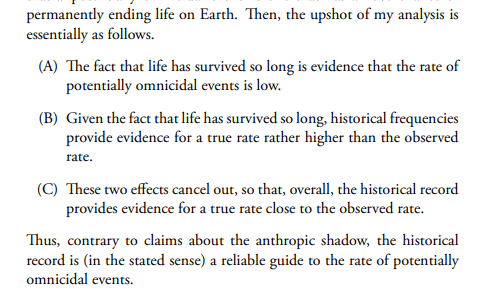This is a linkpost for Dispelling the Anthropic Shadow by Teruji Thomas.
Abstract:
There are some possible events that we could not possibly discover in our past. We could not discover an omnicidal catastrophe, an event so destructive that it permanently wiped out life on Earth. Had such a catastrophe occurred, we wouldn’t be here to find out. This space of unobservable histories has been called the anthropic shadow. Several authors claim that the anthropic shadow leads to an ‘observation selection bias’, analogous to survivorship bias, when we use the historical record to estimate catastrophic risks. I argue against this claim.
Upon a first read, I found this paper pretty persuasive; I'm at >80% that I'll later agree with it entirely, i.e. I'd agree that "the anthropic shadow effect" is not a real thing and earlier arguments in favor of it being a real thing were fatally flawed. This was a significant update for me on the issue.
Anthropic shadow effects are one of the topics discussed loosely in social settings among EAs (and in general open-minded nerdy people), often in a way that assumes the validity of the concept[1]. To the extent that the concept turns out to be completely not a thing — and for conceptual rather than empirical reasons — I'd find that an interesting sociological/cultural fact.


I no longer endorse this, see reply below:
I don't think this does away with the problem, because for decision making purposes the fact that a random event is extinction-causing or not is still relevant (thinking of the Supervolcano vs Martians case in the paper). I didn't see this addressed in the paper. Here's a scenario that hopefully illustrates the issue:
A game is set up where a ball will be drawn from a jar. If it comes out red then "extinction" occurs, the player loses immediately. If it comes out green then "survival" occurs, and the player continues to the next round. This is repeated (with the ball replaced every time) for an unknown number of rounds with the player unable to do anything.
Eventually, the game master decides to stop (for their own unknowable reasons), and offers the player two options:
If they get through this round then they win the game.
The game is played in two formats:
Let's say they both start with a prior that P(red) is 15%, and that the actual P(red) is 20%. Should they adopt different strategies?
The answer is yes:
The point is that the population of Jacks that get the opportunity to make the decision is selected to be only those that receive evidence that imply a low probability, and this systematically biases the decision in a way that is predictable beforehand (such that having the information that this selection effect exists can change your optimal decision).
I think this is essentially the same objection raised by quila below, and is in the same vein as Jonas Moss's comment on Toby's post (I'm not 100% sure of this, I'm more confident that the above objection is basically right than that it's the same as these two others).
It's quite possible I'm missing something in the paper, since I didn't read it in that much detail and other people seem convinced by it. But I didn't see anything that would make a difference for this basic case of an error in decision making being caused by the anthropic shadow (and particularly I didn't see how observing a larger number of rounds makes a difference).
A way to see that this is common-sense irrational is to suppose it's a coin flip instead of a ball being drawn, where it's very hard to imagine how you could physically bias a coin to 99% heads, so you would have a very strong prior against that. In this case if you saw 30 heads in a row (and you could see that it wasn't a two-headed coin) it would still seem stupid to take the risk of getting tails on the next round
I thought about it more, and I am now convinced that the paper is right (at least in the specific example I proposed).
The thing I didn't get at first is that given a certain prior over P(extinction), and a number of iterations survived, there are "more surviving worlds" where the actual P(extinction) is low relative to your initial prior, and that this is exactly accounted for by the Bayes factor.
I also wrote a script that simulates the example I proposed, and am convinced that the naive Bayes approach does in fact give the best strategy in ... (read more)